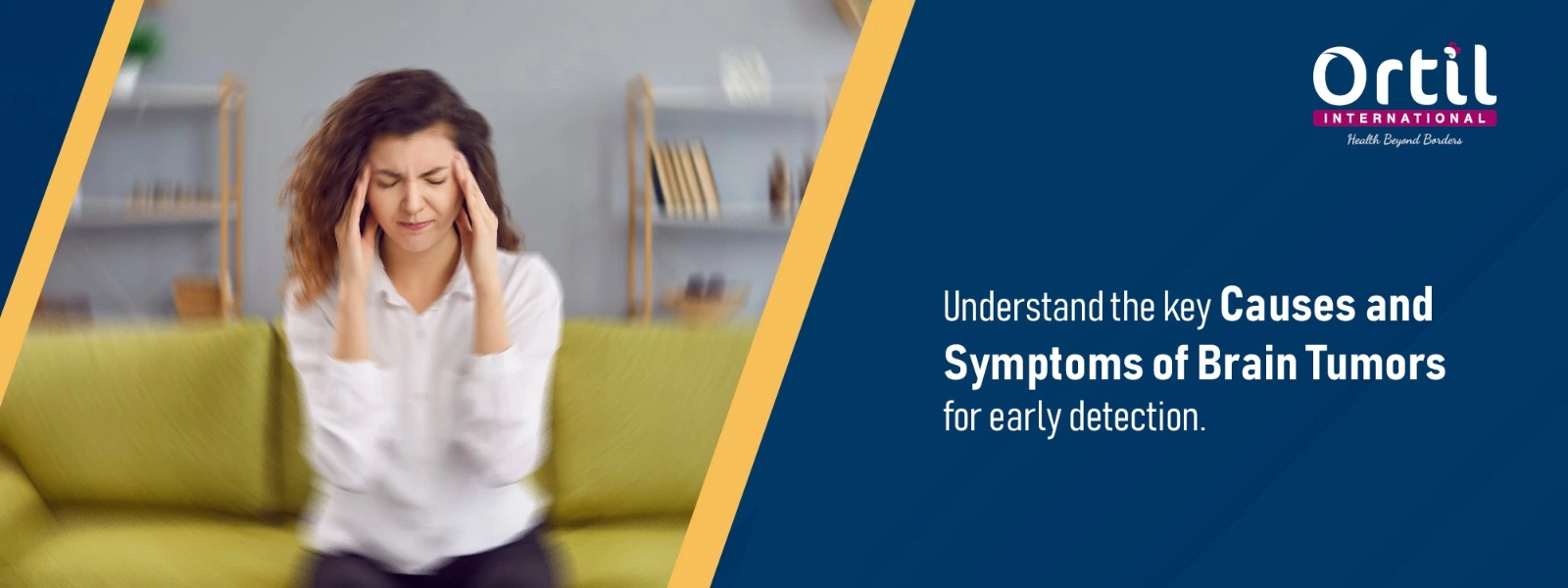What Are The Causes and Symptoms of Brain Tumors
Brain tumors can occur due to some radiation exposure, some genetic condition, or cancer cells spread from another part of the body. Symptoms and signs of a brain tumor depend on their location, but generally, they are associated with headaches, problems in thinking, weakness, numbness, and issues in speech and movements.
 What is Brain Tumor?
What is Brain Tumor?
A brain tumor is a condition where brain cells grow abnormally. These tumor cells can be cancerous or non-cancerous in nature. A brain tumor is an emergency situation even though the cells are not cancerous because of the sensitivity of brain tissues. Brain tumors are classified according to the tissue affected in the brain. Brain tumors that form in the brain are known as primary brain tumors, but when the cancer cells spread from the other part of the body to the brain, it is known as secondary brain tumors.
In some cases, brain tumors grow very slowly, so they do not produce any symptoms. Still, when the tumor is present in the sensitive areas of the brain, it can cause some severe complications and symptoms like paralysis, difficulty in speech, etc. Brain tumors can be treated with surgical procedures or radiation therapy according to the suitability of the patient.
What are the signs and symptoms of brain tumors?
Signs and symptoms of brain tumors depend on the location of the brain in which the brain tumor is present. The size and nature of the tumor can affect the severity of symptoms. Sometimes, small-sized brain tumors present in sensitive areas of the brain and can produce severe symptoms. Some of the signs and symptoms are as follows:
- Headaches
- Seizures
- Nausea and vomiting
- Vision problems
- Hearing problems
- Balance problems
- Cognitive changes
- Personality or behavioral changes
- Memory loss
- Weakness or numbness in limbs
- Speech difficulties
- Confusion
- Fatigue
- Drowsiness
- Difficulty swallowing
What causes brain tumors?
At first, it was thought that brain tumors occur only due to genetic mutations or changes in genes. However, recently, it has been discovered that environmental factors, genetic factors, and the general health of patients can also contribute to the formation of brain tumors. These findings suggest a complex relationship between various aspects of the pathogenesis of brain tumors, which highlights the importance of considering both genetic and environmental factors in understanding and treating the condition of brain tumors. However, some of the causes of brain tumors are described below:
- Genetic mutations
- Family history
- Radiation exposure
- Immune system disorders
- Environmental toxins
- Age
- Gender
- Race and ethnicity
- Hormonal factors
- Viral infections
- Inherited conditions
- Previous cancer treatments
- Industrial chemicals
- N-nitroso compounds in food
When to consult a doctor?
It is crucial to take action if you're experiencing any new, constant, or concerning symptoms that may indicate a brain tumor. Contact your healthcare provider quickly to discuss your symptoms and receive appropriate care.
In case of sudden symptoms such as numbness or weakness in the face, arm, or leg, trouble speaking or understanding speech, vision problems, difficulty with walking or balance, or experiencing the worst headache of your life, go for emergency assistance.
Seizures may not always indicate an emergency situation, but it is important to take professional advice if any of the following occurs:
- You've never had a seizure before
- The seizure lasts longer than 5 minutes
- Another seizure follows the first one
- The person has difficulty breathing or walking after the seizure
- The person has a health condition such as diabetes, heart disease, or is pregnant.
Questions to ask a doctor about brain tumors
Remember to understand your condition and be an active part of your healthcare. It's good to list questions before your appointment and keep asking until you feel confident explaining your condition in your own words. Here are some of the questions you can ask your doctor about your condition and possible treatment options:
Questions related to your condition
- In which part of the brain my tumor is located, and how it will affect me?
- What type of tissues are involved in my brain tumor?
- How much experience do you have in dealing with this disease?
- What are the signs and symptoms of a brain tumor?
- Is there any way to detect brain tumor early symptoms?
Questions related to your possible treatment options
- What treatment options do you suggest that are appropriate for my condition?
- What will happen to me during this treatment?
- What are the benefits of this treatment?
- What are the risks and side effects of each treatment?
- Should the treatment be delayed, or must it be applied quickly??
- How many types of treatment options are available?
Questions related to Follow-up Care
- What follow-up care will I need if I have this treatment?
- If I need to make another appointment, when should it be scheduled? Who should I talk to?
- If you are referring me for further tests, how long will I wait for my next appointment, and what will it involve?
- Do I need to book an appointment with a more experienced doctor?
- What types of rehabilitation, physical therapy, occupational therapy, and other services are available here?
Conclusion
Brain tumors can occur due to a combination of environmental and genetic factors. It is essential to recognize the early signs of brain tumors to prevent any permanent damage to brain tissues. A combination of treatments or a single treatment can be used to treat the disease according to each patient's condition.
FAQ's Of Causes and Symptoms of Brain Tumor
What is the leading cause of brain tumors?
Genetic and environmental conditions and cancer spread from other parts of the body are the leading cause of brain tumors.
How to avoid a brain tumor?
Avoid radiation exposure and live a healthy life with a balanced diet and exercise to avoid cancer and brain tumors.
How to check a brain tumor?
MRI, CT, PET Scan, and biopsy tests are used to check brain tumors.
What is the first stage of a tumor?
When the tumor is small and has not spread to brain tissues in the surrounding area, it is in the first stage of the cancer.
Can a brain tumor be cured?
Brain tumors can be treated with surgical removal procedures or radiation therapy.











 What is Brain Tumor?
What is Brain Tumor?

